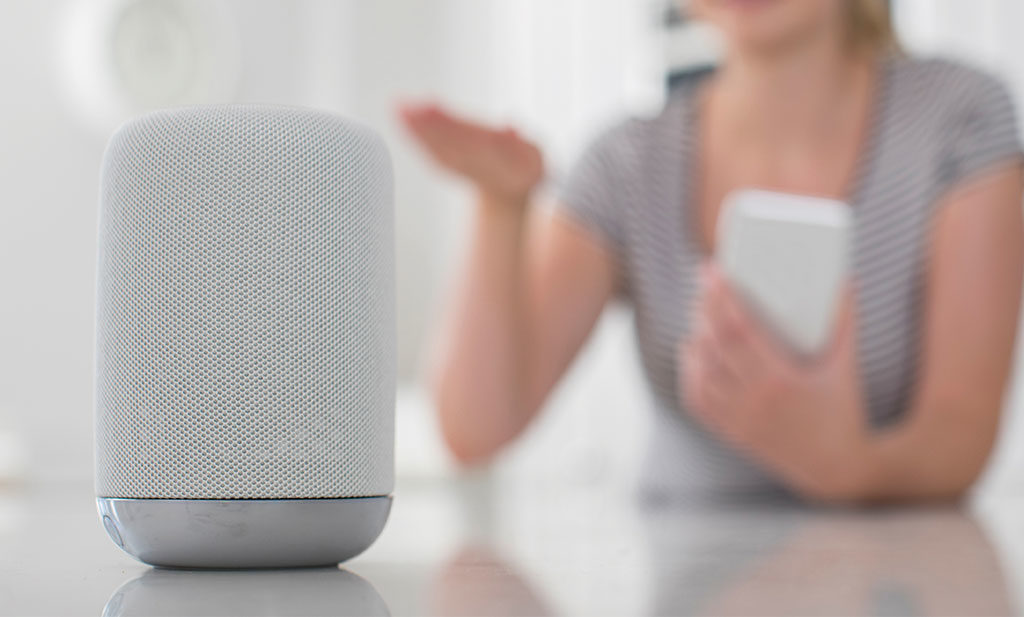It’s safe to say that voice assistants are no longer just the plot of sci-fi movies. Nearly one in five U.S. adults today claim to have access to a smart speaker, according to research from Voicebot.ai. Voice assistants are even being integrated with appliances such as microwaves to make everyday life easier for consumers. Since consumers are never a few steps from smartphones that have similar capabilities, the ongoing adoption of voice search relies heavily on two factors: trust and accessibility.
Unlike standard search engines, one way voice assistants build trust is by providing ad-free consumer search results—at least for now. As smart speakers become even more prevalent, advertising giants are sure to start selling ads to businesses looking to access voice users in their homes. Google says it is still years away from being able to monetize voice searches, despite dominating traditional search results. According to Investor’s Business Daily, Google recently slashed prices for Google Homes in efforts to saturate the market and compete more closely with Amazon. More Google Home users means more consumer data to analyze and leverage to figure out the next step in advertising.
For now, the search giant is working on establishing and maintaining user confidence. The unique selling point of voice search is its convenience, so rolling out ads must balance giving advertisers access to users in their homes while still providing consumers with the information they are looking for. JWT found that 29% of all non-voice users say they “don’t see the point” of voice search. If search results become saturated with ads, that proportion may rise, as users don’t want to listen through ads for the information they are trying to easily access.
Understanding individual consumer behavior—brands they like, where they shop, products they regularly purchase—will be crucial to maintain both usage and trust.
What voice search ads might interest consumers?
- Events: If a user is searching for information about an event (concert, movie, show), provide that information as well as an ad for tickets.
- In-market: Highlight ads for products/services the user is already actively searching for, as learned by user behavior and search history across platforms.
- RLSA lists: Serve retargeted ads from brands whose site the user has recently visited. The likelihood of a user being interested in the ad depends on the time to conversion path for the product/service.
- Commodities: Serve ads for products that are on a repeat purchase cycle, such as toilet paper, diapers, air fresheners, etc. Amazon will have a leg up on Google in this approach, with access to users’ purchase history and buying cycles on the e-commerce platform.
- Quick Purchases/Delivery: With convenience apps (Uber, Instacart, GrubHub, etc.) ingrained in everyday life, there is opportunity for voice search to enhance this functionality. Consumers can already make Amazon purchases over voice and order Domino’s pizza through smart speakers. Other restaurants and retailers could also take advantage of simple purchase initiation through voice search advertising.
- Voice result + visual: With the introduction of the Amazon Echo Show with a screen, Google is now working on visual responses to certain queries including sports scores, weather forecasts, and YouTube videos displayed on devices via Chromecast. This could be particularly useful for retailers that are trying to introduce a new product that a user is actively searching for, since users are unlikely to purchase a product without seeing it first.
These examples show how future voice search ads can be genuinely helpful and informative to enhance user acceptance and trust. Since voice users are already accustomed to frictionless information and shopping experiences using Alexa, Google Home, and Cortana, voice advertising must match the consumer expectation of ease and convenience using these devices.
Example voice ad use case
Let’s apply some of the voice search advertising possibilities above. As the voice search expands, assistants will better be able to match a voice query to the user’s actual intent. If a user calls out the query “red shoes” to their voice assistant, the assistant can map that request onto paid and organic results that deliver the best customer experience.
For the “red shoes” query, here are some valuable potential paid voice results:
- Ad from a nearby store with red shoes. Despite the rumored death of retail, Google says 61% of shoppers would rather shop with brands that have a physical location than ones that are online only. And with recent updates to in-store visit tracking capabilities, Google can more accurately than ever track behavior from ad clicks to store visits
- Coupon from a retailer where the user has shopped previously that has red shoes for sale (RLSA)
- Ad for red shoes the user has looked at recently online (RLSA)
- Shopping ads for red shoes (visual component required)
How to prepare for the future of paid voice search
Voice search advertising possibilities are likely to be implemented soon, but marketers can prepare for paid voice search now by examining their user experience as a whole. According to Gartner, voice-based search queries are the fastest-growing mobile search type. Websites must be responsive and optimized for mobile to take advantage of voice-initiated traffic.
Paid search managers should define and build out RLSA lists. Once voice search ads are rolled out, users who have previously visited the site will be valuable to use for targeting.
Companies can also begin optimizing content to provide useful information consumers are looking for immediately. Preparing web content to rank for organic voice searches helps to integrate voice into seamless customer journeys, laying the groundwork for acceptance of future paid voice search ads. Learn more about how to rank in voice search results by reading our guide to optimizing content for voice search.
—
Considering integrating voice search into your customer experience? Contact us to find out how we can help.







